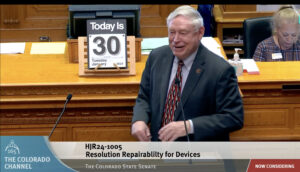Colorado legislators on Tuesday sent to Gov. Jared Polis a slightly tightened bill that will add to the state’s growing right-to-repair law the ability for consumers to fix a wide range of digital electronic equipment.
House members repassed House Bill 1121 along largely partisan lines after voting to concur with a slew of changes made in the Senate, most done at the behest of industry members seeking more assurances of security for their devices and technology. Cosponsoring Sen. Jeff Bridges, D-Greenwood Village, said that the most significant of the changes made the bill the first of its kind in the U.S. that neither Apple nor Google opposed.
The changes did little to salve legislative opposition, as no Republicans backed the bill, joined by one Senate Democrat and two Democrats in the House their opposition to what some said was a taking of rights from manufacturers wanting to ensure product quality. But it buoyed the confidence of supporters that Gov. Jared Polis would sign the bill and give Colorado the broadest repair rights of any state.
“Everything breaks at some point and when it does, we should have the freedom to fix it,” said Danny Katz, executive director of the Colorado Public Interest Research Group (CoPIRG), in a news release. “Right to Repair gives us options when our products fail. This bill empowers consumers, letting us choose when, where and how we fix our products.”
What the digital right to repair covers
If Polis signs HB 1121, it would be the third right to repair he’s enshrined in Colorado law, following protections for wheelchairs passed in 2022 and for agricultural equipment that were passed last year. California, Oregon and Minnesota all have passed some version of a digital right to repair, but Colorado’s law goes further than the others in some ways.
HB 1121 applies to many types of equipment, including computers, cell phones, household gadgets, washing machines, dishwashers and other devices, and it permits owners to repair it themselves or take it to independent repair-shop owners. To facilitate that, the bill requires manufacturers make available to repair shops and individuals the tools, parts, diagnostics and software they need to fix the electronics.

Colorado state Rep. Brianna Titone listens Tuesday while Rep. Steven Woodrow asks the House to concur with Senate changes to a digital right-to-repair bill.
Its unique feature is a ban on “parts pairing,” which is the practice of making equipment like cell phones inoperable if it is fitted without parts obtained from the original maker. Cosponsoring Rep. Brianna Titone, D-Arvada, said that provision went to the heart of the bill in granting more freedom to equipment owners and likely cutting the cost of repairs.
Amendments sought to quell opposition
Tech-industry leaders expressed frustrations as the bill cleared the House, however, that it didn’t do enough to protect device security, particularly in regard to safeguarding trade secrets or ensuring repairers couldn’t get around privacy settings on devices like phones. So, Bridges and cosponsoring Sen. Nick Hinrichsen, D-Pueblo, added eight amendments in the Senate to try to address some of those issues.
They made exemptions to the right to repair for video games and life-safety systems like fire alarms, adding them to already exempted products like marine vessels, all-terrain sports vehicles, medical devices, power tools, anti-theft equipment and solar panels. And they moved the implementation of the proposed law back one year, from 2025 to 2026.
The amendment that led tech giants to drop opposition moved up from 2015 to 2021 the oldest date for products to qualify for the right to repair — a shift industry leaders called necessary because many manufacturers keep replacement parts for only a few years. It also would let companies maintain control over biometric sensors without having to hand out repair information on them and absolves original manufacturers from responsibility for the quality or functionality of parts provided by third-party parts manufacturers.
Legislators also call for federal action on digital repairability
Passage of HB 1121 follows passage in January of a legislative resolution that asked the Federal Trade Commission to promulgate rules requiring manufacturers to disclose to customers basic information about device repairability.

Colorado state Sen. Bob Gardner speaks against a right-to-repair resolution in January.
Like the bill, House Joint Resolution 1005 divided Democrats and Republicans. Bridges argued that it was “about empowering customers to make knowledgeable decisions,” while opposing GOP Sen. Bob Gardner of Colorado Springs arguing that repairability scores can’t account for customers’ ability to actually fix something.
With the legislative session now less than 10 days from its required May 8 adjournment, Polis has until June 7 to sign or veto bills coming from the General Assembly.
